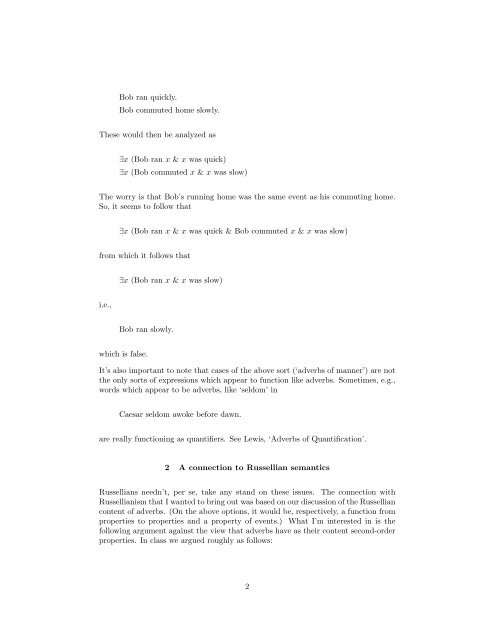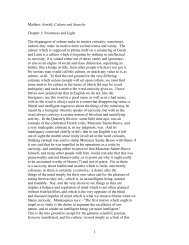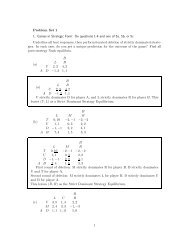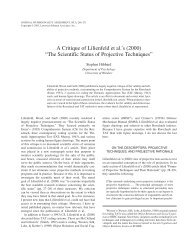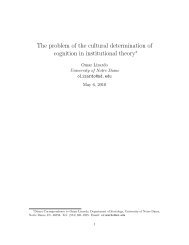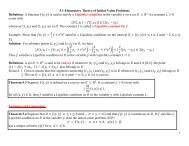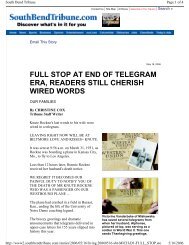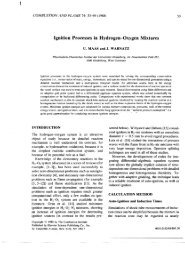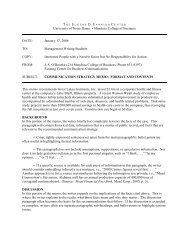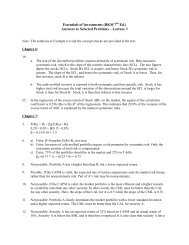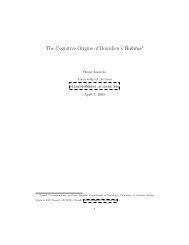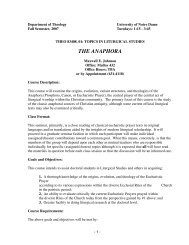Bob ran quickly.Bob commuted home slowly.<strong>The</strong>se would then be analyzed as∃x (Bob ran x & x was quick)∃x (Bob commuted x & x was slow)<strong>The</strong> worry is that Bob’s running home was the same event as his commuting home.So, it seems to follow that∃x (Bob ran x & x was quick & Bob commuted x & x was slow)from which it follows that∃x (Bob ran x & x was slow)i.e.,Bob ran slowly.which is false.It’s also important to note that cases <strong>of</strong> the above sort (‘<strong>adverbs</strong> <strong>of</strong> manner’) are notthe only sorts <strong>of</strong> expressions which appear to function like <strong>adverbs</strong>. Sometimes, e.g.,words which appear to be <strong>adverbs</strong>, like ‘seldom’ inCaesar seldom awoke before dawn.are really functioning as quantifiers. See Lewis, ‘Adverbs <strong>of</strong> Quantification’.2 A connection to Russellian <strong>semantics</strong>Russellians needn’t, per se, take any st<strong>and</strong> on these issues. <strong>The</strong> connection with<strong>Russellianism</strong> that I wanted to bring out was based on our discussion <strong>of</strong> the Russelliancontent <strong>of</strong> <strong>adverbs</strong>. (On the above options, it would be, respectively, a function fromproperties to properties <strong>and</strong> a property <strong>of</strong> events.) What I’m interested in is thefollowing argument against the view that <strong>adverbs</strong> have as their content second-orderproperties. In class we argued roughly as follows:2
Adverbs can’t express properties <strong>of</strong> properties since, if they did, ‘walkedslowly’ would be indistinguishable from the proposition expressed by‘Walking is slow’, which attributes the property <strong>of</strong> being slow to theproperty <strong>of</strong> walking. But ‘walked slowly’ doesn’t express a proposition byitself.<strong>The</strong> conclusion <strong>of</strong> this argument is correct — <strong>adverbs</strong> don’t express properties <strong>of</strong>properties — but it is important to see that the form <strong>of</strong> argument is not one whichcan be accepted by the Russellian. <strong>The</strong> argument relies on some principle like thefollowing:If you have a series <strong>of</strong> expressions e 1 . . . e n which express some proposition,<strong>and</strong> replace one <strong>of</strong> the expressions in the string with another expressionwith the same content, the resulting string <strong>of</strong> expressions shouldalso express a proposition.This will not, in general, hold, as Russell recognized in the Principles <strong>of</strong> Mathematics§52:“It is plain, to begin with, that the concept which occurs in the verbalnoun is the very same as that which occurs as verb. . . . <strong>The</strong> questionis: What logical difference is expressed by the difference <strong>of</strong> grammaticalform? . . . in regard to verbs, there is a further point. By transformingthe verb, as it occurs in a proposition, into a verbal noun, the wholeproposition can be turned into a single logical subject, no longer asserted,<strong>and</strong> no longer containing in itself truth or falsehood. But here too, thereseems to be no possibility <strong>of</strong> maintaining that the logical subject whichresults is a different entity from the proposition. ‘Caesar died’ <strong>and</strong> ‘thedeath <strong>of</strong> Caesar’ will illustrate this point. If we ask: What is asserted inthe proposition ‘Caesar died’? the answer must be ‘the death <strong>of</strong> Caesaris asserted.’ In that case, it would seem, it is the death <strong>of</strong> Caesar whichis true or false; <strong>and</strong> yet neither truth nor falsity belongs to a mere logicalsubject. <strong>The</strong>re appears to be an ultimate notion <strong>of</strong> assertion, given by theverb, which is lost as soon as we substitute a verbal noun, <strong>and</strong> is lost whenthe proposition in question is made the subject <strong>of</strong> some other proposition.This does not depend upon grammatical form; for if I say ‘Caesar diedisa proposition’, I do not assert that Caesar did die, <strong>and</strong> an element whichis present in ‘Caesar died’ has disappeared. Thus the contradiction whichwas to have been avoided, <strong>of</strong> an entity which cannot be made a logicalsubject, appears to have here become inevitable. This difficulty, whichseems to be inherent in the very nature <strong>of</strong> truth <strong>and</strong> falsehood, is onewith which I do not know how to deal satisfactorily.”Russell’s last example is not the best one to make the point. <strong>The</strong> more general worryis that if, as seems otherwise plausible, we take verbs <strong>and</strong> verbal nouns to have the3


